
Asaf Jah VI, also known as, Sir Mir Mahboob Ali Khan Siddiqi Bayafandi was the 6th Nizam of Hyderabad. He ruled Hyderabad state, one of the Princely states in India between 1869 and 1911.

Paigah is a noble family in the senior aristocracy of Hyderabad State, who were associated with ruling Nizam since its inception. and each maintained his own court, individual palaces, and a standing army of about fourteen thousand troops, both infantry and cavalry.
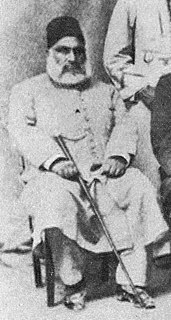
Nawab Viqar-ul-Mulk was an Indian Muslim politician and one of the founders of All India Muslim League. Nawab Mushtaq Hussain or Nawab Viqar Ul Mulk was also the maternal uncle of Sir Ziauddin Ahmed, a mathematician and pillar of the Aligarh Movement.

Vikarabad is a town and mandal in Vikarabad district of the Indian state of Telangana. It is located in Vikarabad mandal of Vikarabad revenue division.
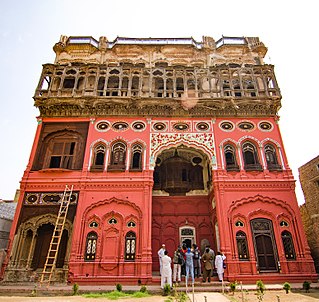
Omar Hayat Mahal, also spelt Umer Hayat Mahal, and alternatively known as Gulzar Manzil, is an early 20th-century wooden haveli mansion in Chiniot, Pakistan.
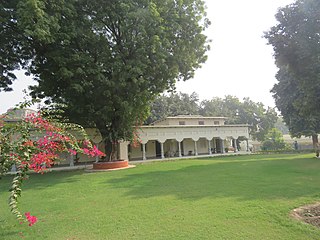
Swaraj Bhavan is a large mansion located in Prayagraj India, best known for once being owned by the Indian political leader Motilal Nehru and being home to the Nehru family until 1930.
The All India Muhammadan Educational Conference was an organisation promoting modern, liberal education for the Muslim community in India. It was founded by Sir Syed Ahmed Khan, also the founder of the Aligarh Muslim University. All India Mumammadan Educational Conference was the origin of the All-India Muslim League. The Muslim League was born in the 20th session of All India Muhammadan Educational Conference, which was established by Syed Ahmed Khan in Aligarh in 1886. Muhammadan Educational Conference used to hold its annual meetings in various cities where, by the co-operation of local Muslims, steps were taken for the progress of education.
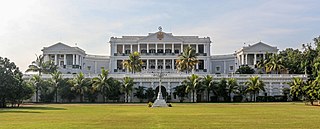
Falaknuma is a palace in Hyderabad, Telangana, India. It originally belonged to the Paigah family, and was later owned by the Nizam of Hyderabad. It is on a hillock and covers a 13-hectare (32-acre) area in Falaknuma, 5 kilometres (3.1 mi) from Charminar.
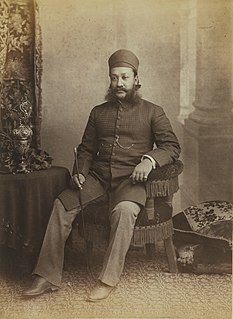
Sir Viqar ul-Umara, Iqtidar ul-Mulk, Iqbal ud-Dowla, Secundar Jung, Nawab Muhammad Fazl-ud-din Khan Bahadur, was the Prime Minister of Hyderabad from 1893 to 1901, and also served as the Amir e Paigah from 1881 to 1902.

Nawab Sir Muhammad Mazharuddin Khan Bahadur, commonly known as Sir Asman Jah or Nawab Sir Asman Jah Bahadur, was an Indian noble who served as Prime Minister of Hyderabad from 1887 to 1894. A member of the powerful Paigah family, He Was a grandson of His Highness the Nizam Nawab Sikander Jah, Asaf Jah III And he was married to parwarish unisa begum daughter of Afzal-ud-Daulah 5th nizam of Hyderabad State, Asman Jah built the Asman Garh Palace, Basheer Bagh Palace, saroonagar palace and Mahboob Chowk Clock Tower. He also represented Nizam Mahbub Ali Khan at the Golden Jubilee of Queen Victoria and played as regent to Mahboob Ali Khan.

Paigah Palace was built by Sir Vicar-ul-Umra, a Paigah nobleman. This was built after he gave the famous Falaknuma Palace to the sixth Nizam of Hyderabad state, Mahbub Ali Khan, Asaf Jah VI. The Palace houses the Consulate General of the US in Hyderabad.

Paigah Tombs or Maqhbara Shams al-Umara, are the tombs belonging to the nobility of Paigah family, who were fierce loyalists of the Nizams, served as statespeople, philanthropists and generals under and alongside them. The Paigah tombs are among the major wonders of Hyderabad State which known for their architectural excellence as shown in their laid mosaic tiles and craftsmanship work. The Paigah's necropolis is located in a quiet neighbourhood 4 km southeast of Charminar Hyderabad, at Pisal banda suburb, down a small lane across from Owasi Hospital near Santosh Nagar. These tombs are made out of lime and mortar with beautiful inlaid marble carvings. These tombs are 200 years old which represent the final resting places of several generations of the Paigah Nobles.

Errum Manzil or Iram Manzil is an expansive palace standing in Hyderabad, Telangana, India. It was built around the year 1870 by Nawab Safdar Jung Musheer-ud-daula Fakhrul Mulk, a nobleman of Hyderabad state. It is located on top of a hillock off the Khairatabad - Panjagutta road.

Begum Viqar un Nisa was the First Lady of Pakistan from 1957 to 1958. By profession, she was a social worker. She married 7th Pakistani Prime Minister Sir Feroz Khan Noon in 1945 and also participated in the Pakistan Movement, which led to the creation of the Islamic Republic of Pakistan. Viqar was an Austrian by birth and origin, and was born as Victoria in July 1920.
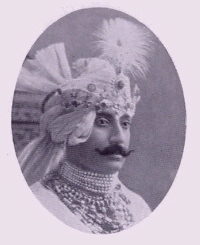
Sayyid Sir Wasif Ali Meerza Khan Bahadur was the Nawab of Murshidabad during 1906–1959. Sir Wasif Ali Meerza was educated at Sherborne School, Rugby School and later at Trinity College. He succeeded his father Hassan Ali Meerza Khan Bahadur at his death on 25 December 1906. On 11 December 1931, Wasif Ali was forced to surrender the administration of his estates to the Government of India after incurring a debt of ₹19 lakhs. On 15 August 1947, the Radcliffe Award allotted the district of Murshidabad to Pakistan and the flag of Pakistan was hoisted at the Hazarduari Palace but within two days the two dominions exchanged Khulna, which is now in Bangladesh, and then the flag of India was hoisted at the grand palace on 17 August 1947. The Government of India also resumed him all his estates in 1953. Wasif Ali was also the founder and president of the Hindu–Muslim Unity Association in the year 1937, named Anjuman-e-Musalman-e-Bangla, which promoted Hindu–Muslim unity. The Nawab also built the Wasif Manzil.

The Chitral Expedition was a military expedition in 1895 sent by the British authorities to relieve the fort at Chitral, which was under siege after a local coup following the death of the old ruler. An intervening British force of about 400 men was besieged in the fort until it was relieved by two expeditions, a small one from Gilgit and a larger one from Peshawar.

The Old City of Hyderabad is a walled city of Hyderabad, Telangana, India, located on the banks of the Musi River built by Qutb Shahi sultan Muhammed Quli Qutb Shah in 1591 AD. There used to be a wall surrounding the Old City, most of which is destroyed. Mubariz Khan, the Mughal governor of Deccan Subah, had fortified the city in 1712 and was completed by Nizam of Hyderabad.

The Spanish Mosque, also known as Masjid Iqbal Ud Daula or Jam e Masjid Aiwan-E-Begumpet, is a mosque within the Paigah Palace, Begumpet, Hyderabad, India.

Devdi Iqbal ud-Dowla is a mansion and heritage structure located in Hyderabad, India. It was the devdi of nobleman Sir Viqar ul Umra. It was built in the late 18th century. The historic structure is neglected by authorities and is on the verge of destruction.

Aiwan-i Begumpet also known as Chiraan Fort Palace, and Devdi Fareed Nawaz Jung or Devdi Nazir Nawaz Jung was built in 1880 by Sir Viqar-ul-Umra, a Paigah nobleman who served as Prime Minister of Hyderabad. The palace was built after the construction of Falaknuma Palace gifted to the sixth Nizam of Hyderabad Mir Mahbub Ali Khan, Asaf Jah VI. Devdi is one of the complex in the Paigah Palace residence house of the Paigah Nobelity, In the hierarchy of nobles of Hyderabad, the Paigah family ranked immediately next to the ruling family of Nizams.



















